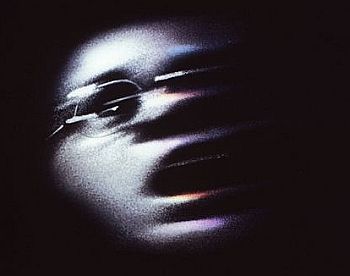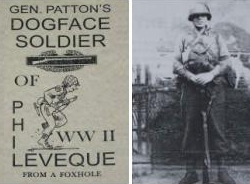
Publisher:
Bonnie King
CONTACT:
Newsroom@Salem-news.com
Advertising:
Adsales@Salem-news.com

~Truth~
~Justice~
~Peace~
TJP
Jul-06-2010 15:14

 TweetFollow @OregonNews
TweetFollow @OregonNews
Battle Stress & Over Medicated Combat Soldiers: with Anti-Depressants and Opiates
Dr Phillip Leveque Salem-News.comWhat is more stressful?
 The most frightening thing about Jacob Singer's nightmare is that he isn't dreaming - from the cover of the film 'Jacobs Ladder' |
(MOLALLA, Ore.) - The U.S. Army has almost always given or permitted Combat Soldiers medicine whether it was cigarettes at 5 cents a pack, beer, real cheap at camp beer joints, opium during the Civil War or a tot of rum during the Revolutionary War. I addressed this in the Salem-News.com article, Dangerous Drugs for Combat Soldiers - Zombies on the Attack In my war, WWII, Europe was awash with all kinds of wine, cognac, and every et cetera you can think of[1].
I just read an article in Foreign Policy, December ’08. The title was This is Your Brain on War. It reminded me of the TV advertisement showing an egg frying in a pan This is Your Brain on Meth[2].
Guess what, Meth was Methylamphetamine or Pervertin in Germany AND Amphetamine in the US Army all have been used on Combat Soldiers (and Marines) in battle. This new article indicates pseudo pharmacologist journalists jumping in where angels dread to tread.
The reporter quotes Jonathan Moreno, an EXPERT on neuroscience and warfare who works for the Center for American Progress (whoever they are), wants to give soldiers drugs improving a soldiers ability to process information altering brain chemistry[3].
We gottum, they are called amphetamines and caffeine. The only thing is they cause brain burnout, and after a while the soldier is worse off. The Army tried LSD and many of the psychotropics. Nothing beats a well-rested soldier and that is usually not possible.
It may surprise Mr. Moreno and collaborator Diane Griffin, a microbiologist (?) to know that many psychotropic drugs are being used in Iraq et al, now for “Battle Terrors” and complete exhaustion. The most common drugs seem to be anti-depressants (which really aren’t) and morphine-like drugs (They also use local moonshine and “hash”). These drugs almost as a group are supposedly for anxiety disorder which is a euphemism for battle terror and anguish NOT ANXIETY nor DEPRESSION.
In the meantime, these drugs are literally frying brains and causing addictions, suicides, PTSD, spousal abuse when they get home, murder, alcoholism with death or tobacco addiction with death.
The Army and Navy doctors overseeing Marines are seriously screwing up, and then they unload these patients on the VA, which further screws them up.
HELP HELP HELP!!!
References:
[1] March-28-2010: Dangerous Drugs for Combat Soldiers - Zombies on the Attack Dr. Phillip Leveque Salem-News.com
[2] Oct-15-2008: This is Your Brain on War - Foreign Policy
[3] Center for American Progress - Wikipedia
 Got a question or comment for Dr. Leveque?
Got a question or comment for Dr. Leveque?Email him: Newsroom@Salem-News.com
 More information on the history of Leveque can be found in his book, General Patton's Dogface Soldier of Phil Leveque about his experiences in WWII.
More information on the history of Leveque can be found in his book, General Patton's Dogface Soldier of Phil Leveque about his experiences in WWII.
Order the book by mail by following this link: Dogface Soldier.
If you are a World War II history buff, you don't want to miss it.
Watch for more streaming video question and answer segments about medical marijuana with Bonnie King Dr. Phil Leveque.
Click on this link for other articles and video segments about PTSD and medical marijuana on Salem-News.com: Dr. Leveque INTERVIEWS & ARTICLES
Articles for July 5, 2010 | Articles for July 6, 2010 | Articles for July 7, 2010



Quick Links
DINING
Willamette UniversityGoudy Commons Cafe
Dine on the Queen
Willamette Queen Sternwheeler
MUST SEE SALEM
Oregon Capitol ToursCapitol History Gateway
Willamette River Ride
Willamette Queen Sternwheeler
Historic Home Tours:
Deepwood Museum
The Bush House
Gaiety Hollow Garden
AUCTIONS - APPRAISALS
Auction Masters & AppraisalsCONSTRUCTION SERVICES
Roofing and ContractingSheridan, Ore.
ONLINE SHOPPING
Special Occasion DressesAdvertise with Salem-News
Contact:AdSales@Salem-News.com


Terms of Service | Privacy Policy
All comments and messages are approved by people and self promotional links or unacceptable comments are denied.
[Return to Top]
©2026 Salem-News.com. All opinions expressed in this article are those of the author and do not necessarily reflect those of Salem-News.com.